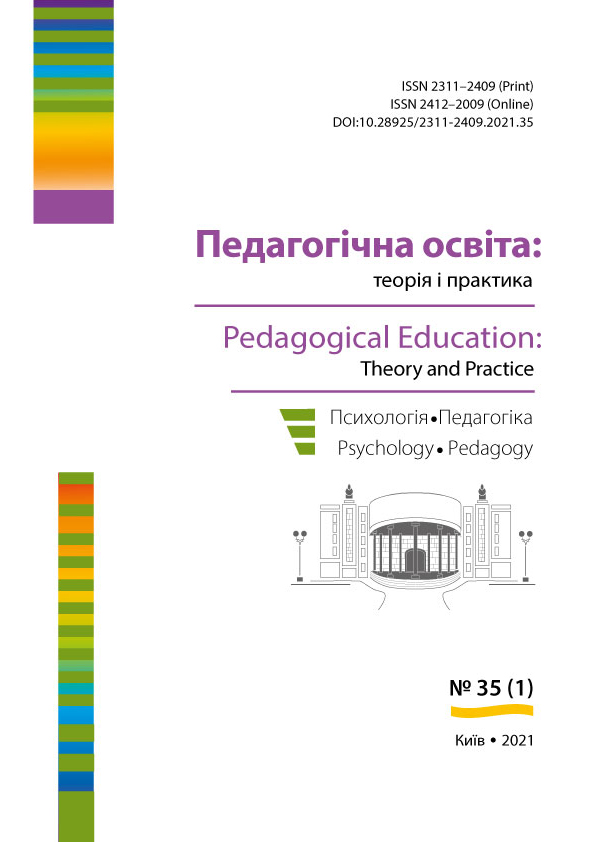PSYCHOLOGICAL SECURITY FORMULA AS A CONCEPTUAL BASIS FOR FORMATION OF SAFE BEHAVIOR SKILLS
DOI:
https://doi.org/10.28925/2311-2409.2021.3513Abstract
The purpose of the article is to conduct theoretical analysis of the psychological safety formula and its components based on the basic mechanisms of the human psyche.
Tasks of the article:
- to carry out a theoretical analysis of the problem of personal safety in national and foreign studies;
- to define the meaning of “safety”, “physical comfort”, “psychological comfort”, “social comfort”, “safety culture”, “risk analysis” in the socio-psychological dimension;
- to develop a psychological formula of safety aimed at ormation of skills of safe behavior of the individual. The scientific innovativeness and theoretical significance of the conducted study is in the fact that development of a conceptual basis for the formation of safe behavior skills of the individual is based on awareness and reflection of issues that meet the basic need for It is established that individual safety is an inner experience of safety sense, which reflects the degree of comfortable existence and absence of external threats. The main role in the formation of safe behavior skills of the individual is played by regulatory mechanisms related to various psychological areas, including activities, mental states, personal qualities and characteristics, as well as external conditions. Thus, the formation of safe behavior skills of the individual is a process of meaningful and reflective use of knowledge, skills and cultural experience in the field of personal and social safety.
The result of the theoretical analysis of the problem of personal safety was a scientific base of the main structural elements of the psychological formula of safety. It is determined that the psychological formula of safety is a functional structure of personal safety, which is universal in relation to its content, which combines the results of mastering sustainable social traditions of protection (safety culture) and a set of favorable environmental conditions when physical, mental and social functions are in a state of less stress, and the person himself feels satisfaction (physical, psychological and social comfort), determined by the ability to explore and study life- threatening situations, their vulnerability to risky situations (risk analysis). One of the promising areas of research of this problem is development of algorithm of universal psychoprophylactic programs for formation of safe behavior skills of the individual.
Downloads
References
Алєксєєва Т.В. Аналіз психологічних ризиків у процесі розвитку відповідальності студентів ви- щої школи: теоретичні засади. Педагогічний процес: теорія і практика. 2013. Вип. 3. С. 195–204. URL: http://irbis-nbuv.gov.ua/cgi-bin/irbis_nbuv/cgiirbis_64.exe?I21DBN=LINK&P21DBN=UJRN&Z21 ID=&S21REF=10&S21CNR=20&S21STN=1&S21FMT=ASP_meta&C21COM=S&2_S21P03=FILA=&2_ S21STR=pptp_2013_3_23
Аргайл М. Межличностное общение / сост. и общ. ред. Н.В. Казариновой, В.М. Погольши. Санкт-Петербург: Питер, 2001. 512 с.: ил. (Серия «Хрестоматия по психологии»).
Баева И.А. Психология безопасности: история, становление, перспективы. Национальный психологический журнал, 2007. №1 (2). С. 65–69.
Баева И.А. Психологическая защищенность и психологическая безопасность современного че- ловека URL: http://www.web.ruscenter.ru/ conf2/baeva.doc. Заголовок з екрана.
Баева И.А., Баев Н.Н. Психологические ресурсы защищенности студентов как показатель психологической безопасности личности. Психологическая наука и образование. 2013. № 1. С. 1–9. URL: http://psyedu.ru/files/articles/psyedu_ru_2013_1_3231.pdf
Карамушка Л.М., Дектярьова Т.В. Дослідження змісту психологічної безпеки освітнього середо- вища вищих навчальних закладів. Правничий вісник Університету «КРОК», 2013. № 16. С. 203–210.
Слюсаревський М.М. Психологічна безпека людини в онтологічному і гносеологічному вимірах. Післямова до роботи, відзначеної Державною премією України в галузі науки та техніки. Наукові студії з соціальних та політичних наук. 2020. Вип. 45 (48). С. 7–26.
Povey J.-L., Boreham P., Tomaszewski W. (2013). The Development of a New Multi-Faceted Model of Social Wellbeing: Does income level make a difference? Journal of Sociology. Vol. 52, No 2, 155–172. URL: https://journals.sagepub.com/doi/pdf/10.1177/1440783313507491
Prilleltensky, I. (2005). Promoting Well-Being: Time for a paradigm shift in health and human services.
Scandinavian Journal of Public Health. Vol. 33, suppl. 66, 53–60.
Scribner Dictionary. Mission Hills, 1986. 1190 р. Р. 200.
Sheldon K. M., Kasser T. (2001). Getting Older, Getting Better? Personal Strivings and Psychological Maturity across the Life Span. Developmental Psychology. Vol. 37, No 4. Р. 491–501.
REFERENCES
Alieksieieva, T. V. (2013). Analiz psykholohichnykh ryzykiv u protsesi rozvytku vidpovidalnosti studentiv vyshchoi shkoly: teoretychni zasady. Psykholohiia, 2013, 195–204 [in Ukrainian].
http://irbis-nbuv.gov.ua/cgi-bin/irbis_nbuv/cgiirbis_64.exe?I21DBN=LINK&P21DBN=UJRN&Z21ID
=&S21REF=10&S21CNR=20&S21STN=1&S21FMT=ASP_meta&C21COM=S&2_S21P03=FILA=&2_
S21STR=pptp_2013_3_23
Arhail, M. (2001). Mezhlichnostnoie obshchenie. Sostavlenie i obshchaia redaktsiia N. V. Kazarinovoi,
V. M. Pogolshi, SPb.: Piter, 512 p. [in Russian].
Baieva, I. A. (2007). Psikhologiia bezopasnosti: istoriia, stanovlenie, perspektivy. Natsionalnyi psikhologicheskii zhurnal, 2007, 1 (2), 65–69 [in Russian].
Baieva, I. A. Psikhologicheskaia zashchishchennost i psikhologicheskaia bezopasnost sovremennogo cheloveka [in Russian].
www.web.ruscenter.ru/ conf2/baeva.doc
Baieva, I. A., Baiev, N. N. (2013). Psikhologicheskieye resursy zashchishchennosti studentov kak pokazatel psikhologicheskoi bezopasnosti lichnosti. Psykhologicheskaia nauka i obrazovanie, 2013, 1, 1–9 [in Russian].
http://psyedu.ru/files/articles/psyedu_ru_2013_1_3231.pdf
Karamushka, L. M., Dektiarova, T. V. (2013). Doslidzhennia zmistu psykholohichnoi bezpeky osvitnioho seredovyshcha vyshchykh navchalnykh zakladiv. Pravnychyi visnyk Universytetu “KROK”, 2013, 16, 203– 210 [in Ukrainian].
Sliusarevskyi M. M. (2020). Psykholohichna bezpeka liudyny v ontolohichnomu i hnoseolohichnomu vymirakh. Pisliamova do roboty, vidznachenoi Derzhavnoiu premiieiu Ukrainy v haluzi nauky ta tekhniky. Naukovi studii z sotsialnykh ta politychnykh nauk, 2020, Vyp. 45 (48), pp. 7–26.
Povey, J.-L., Boreham, P., Tomaszewski, W. (2013). The Development of a New Multi-Faceted Model of Social Wellbeing: Does income level make a difference? Journal of Sociology, Vol. 52, No 2, 155–172 [in English].
https://journals.sagepub.com/doi/pdf/10.1177/1440783313507491
Prilleltensky, I. (2005). Promoting Well-Being: Time for a paradigm shift in health and human services.
Scandinavian Journal of Public Health, Vol. 33, suppl. 66, 53–60 [in English].
Scribner Dictionary. (1986). Mission Hills, 1190 p., p. 200 [in English].
Sheldon, K. M., Kasser, T. (2001). Getting Older, Getting Better? Personal Strivings and Psychological Maturity across the Life Span. Developmental Psychology, Vol. 37, No 4, 491–501 [in English].

